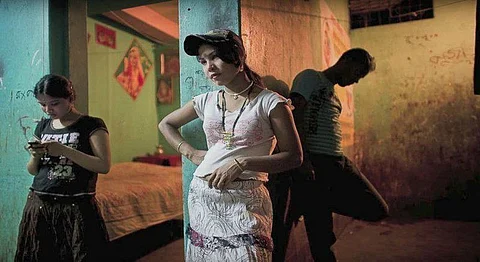
- HOMEGROWN WORLD
- #HGCREATORS
- #HGEXPLORE
- #HGVOICES
- #HGSHOP
- CAREERS
- ABOUT US
- CONTACT US

According to the Ministry of Women and Child Development report, there are about three million sex-workers operating in India, with about 35 percent under the age of 18, since 2007. The Government Of India provides no legal parameters for sex-workers by means of which they can ensure a better future for themselves and their children. While the government does not criminalise prostitution, the law bans several activities around prostitution that along with societal stigma, make it impossible for sex-workers to voice themselves when exploited. Moreover by boycotting sex-workers from mainstream society we deprive their children an alternate form of living; a way of ending a generational cycle of flesh-trade.
We get a glimpse of these trials and tribulations in The Road Not Taken, a documentary by Blurb Productions and Antoine de Villiers, about a children’s shelter – SPID SMS Centre in Delhi’s MCD School Building at G.B Road – that lies at the heart of the city’s most notorious red light district. Established in 1991 the shelter with its four rooms provides care, nutrition and education to children born under the stigma of prostitution.
Over one thousand children from the red light area have been through the centre in the last two decades and around 500 of them have completed college education. Currently, the centre provides boarding facilities to thirty- five children, and for older children, it raises funds to send them to boarding schools and other shelters in different states of India.
Antoine de Villiers, a philanthropist and painter invited Aditi Kodesia, director and producer of ‘The Road Not Taken’, to document the painting workshops she conducts with the children at SPID SMS Centre. “At Blurb, we always try to make time for at least one passion project a year, and the more I spoke to Antoine, the clearer it became to me, that we had to do something to help this shelter get more visibility,” says Kodesia when asked what drove her to make this documentary.
Antoine inspired by the creative energy of the children, put up an art exhibition, ‘heART - Art for Hope’ in November 2016 at New Delhi’s Safdarjung Development Area to celebrate the works of the SMS Centre’s children outside the red-light district. The exhibition raised INR 9 lakhs in funding for the shelter that desperately needs financial resources to expand, especially for developing a care home for girls.
This 18 minute documentary takes us into the life of the remarkable Lalitha Nayak, social activist and founder of the SMS Centre, who has relentlessly worked with unconditional affection to give the children born in the brothels of GB Road a chance at a better future.
In a gripping moment in the film, an unnamed woman, forced into prostitution as a child, looks into the camera, her face hidden by a hijab, her gaze piercing and painful as she says, “I had tears in my eyes when I saw other children go to school and I had to pleasure men. I just wanted to be capable enough like them. Today I am happy because my daughter’s life is not the hell I lived in. I owe this to the SMS Centre.”
In another scene we meet Divya, a former resident of the shelter, now an independent housekeeper breakdown, saying, “I just wanted my mother to play with me, like all the other kids’ mothers did.”
While the SMS Centre has taken children away from the violence and neglect they’re face with at the brothels; sex-workers themselves bring their children to the Centre, where they often leave them for better care than they themselves can provide. This separation between mother and child is equally traumatising for both. A sense of hope appears when 11-year-old Hrithik, inspired by Antoine’s art classes says, “I want to be an artist and then one day I will have my own house where I can live with my mother.” What binds Lalitha, Antoine and the sex workers of GB Road is their singular concern; putting an end to the cycle of human trafficking by focusing on the betterment of the children at the shelter. These moments of triumph and tragedy in the film take us through the lives of unsung heroes like Lalitha, whose stories must be watched for their interminable fortitude.
After watching the ‘The Road Not Taken’ iPartner India, a UK-based charity trust decided to sanction a grant of £8000 to support the shelter; a proud moment for Blurb Productions who hoped that their documentary could provide some aid to the mothers and children at the SMS Centre.
If you liked this article we suggest you read:
